Netigate is a reliable partner for more than 1,500 companies worldwide.
This is how you proceed: How to use Netigate complaints procedure directly
COMPLAINTS PROCEDURE DEFINITION
What does a complaints procedure look like according to BAFA?
By observing the following guidelines according to BAFA (Federal Office for Economic Affairs and Export Control), an effective and fair complaints procedure can be ensured. Possible violations of human rights and environmental standards in global supply chains should thereby be reported and dealt with appropriately.
1. Internal and external: The complaints procedure must be open to employees and suppliers of the company (internal) as well as to external stakeholders, such as human rights defenders or the public.
2. Available at any time: The procedure should be available at any time, so that complaints can be filed at any point in time without being limited to certain times or working days.
3. Easily accessible: The procedure must be easily accessible to all stakeholders. There should be clear information on how and where to file complaints.
4. Possible anonymity: To mitigate possible concerns about negative consequences, there should be the possibility to file complaints anonymously.
5. Language accessibility: The complaints procedure should be available in simple language in different languages to ensure that it is accessible to all affected parties, regardless of their language skills.
Here's how you proceed: How to use Netigate complaints procedures directly
STEP 1
Get started with free templates
This template is already multilingual in both German and English. To comply with the guidelines, personal contact details are deliberately not marked as required. In addition, the country selection is based on BAFA's recommended country list from United Nations Statistics Division.
The logics are based on the complaint type (human rights, environmental protection or other) and the individual complaint subjects are linked by complaint request through respective logics.
This means that if someone wants to report a company for human rights and more specifically for possible child labour, by logic they only get the specific form for child labour. This is not only more user-friendly for the person, but makes your work easier afterwards when you have to document the cases and report on the possible violations.
STEP 2
Adapt the template to your corporate design
After you have opened the template, you can adapt it to your needs and your corporate design. For example, you can completely change the design in the settings bar and add your own logo.
Also customise your company details in the template, such as company name and contact information. Of course, you can also customise entire question fields and pages.
Step 3
Would you like to include more languages?
No problem! You have two options:
Method 1: You can activate the different languages in the settings and then start translating the questions and info texts directly. The advantage here is that you thus have all languages in a single survey, but with several languages it can also mean some hard work.
That's why there's method 2: You can copy all surveys as often as you like and upload the translations of the questions at once with Magic Import. This is the easiest method and with language-separated surveys, you can use them more flexibly on your global websites, for example. You can thus set up an overview for the different countries on your website and link the respective languages.
STEP 4
Usable everywhere due to various distribution options
One of the guidelines of the Supply Chain Act requires easy access to the complaints procedure. You can choose several suitable distribution methods for your procedure with Netigate:
a. Email: Send the survey via Netigate's email system. This way you can start by informing your suppliers about your complaints procedure and send a reminder email at regular intervals.
b. General link: Generate a survey link and use it in your email signature, for example, or convert it into a QR code for offline activities.
c. Website embedding: Place your complaints procedure on landing pages, e-shops, blogs or other online platforms.
d. (Two-way) SMS: Communicate even more flexibly and quickly using text messages.
STEP 5
Set up alerts and notifications
Adjust the contact email in the settings so that the responsible person receives a notification email directly with the collected data for each complaint submitted. This way you can react quickly to complaints received.
In addition, you can set Live Alerts and thus react quickly to critical, imminent offences. First you determine a trigger, such as when the field "the offence is imminent and urgent" was selected and set this in the logic. Then you set the notifications. You can follow the complaints on live dashboards.
We also have a step-by-step guide on how to set the triggers and logics in no time.
STEP 6
Create documentation and reports in seconds
An essential part of the Supply Chain Sourcing Obligations Act (LkSG) is documentation and reporting. Netigate has a comprehensive reporting function.
Features include report export to Excel, which allows you to quickly and easily transfer your data to Excel format.
The Quick Analysis gives you a quick overview of the most important results, so you can immediately identify the relevant information. With the help of filters you can better segment the collected data and gain specific insights.
In addition, Netigate offers KI-driven text analysis, which automatically captures your responses and groups them into predefined topics. This saves you valuable time in manually sorting the responses and quickly gives you a clear overview of the most important statements and complaint points.
Extra step with extra support: We're happy to help with your LkSG projects
STEP 7
Netigate Consulting Expert Team
Netigate Consulting offers individual expert support and tailored solutions for your supply chain act projects in the implementation of due diligence. In our team, we combine professional expertise from the fields of social sciences, economics and statistics with practice-oriented know-how.
The project process with Netigate Consulting is divided into the following phases:
1. Setup:
In a kick-off workshop we jointly define the study design and develop the specific questionnaire.
2. Implementation:
Our team takes over the questionnaire programming and takes care of the address handling as well as the background variables.
3. Implementation:
We support you in sending out the survey and monitor the field process.
4. Analysis:
Once the data collection is complete, we process the data and conduct a comprehensive data analysis, which serves as the basis for reporting.
5. Communication:
We present the results to you in a meaningful results presentation, and if you wish we can also offer you a train-the-trainer workshop.
6. Measures:
Together we develop measures based on the findings of the survey in an action planning workshop. Our team accompanies you in the implementation of these measures and advises you on further survey concepts.
We give you the choice between a full-service approach or a do-it-yourself option. Our team of experts at Netigate Consulting is there to support you at every stage of your LkSG project - from designing the questionnaire to communicating the results.
COMPLAINTS PROCEDURE DEADLINE
When do you need to set up a complaint procedure?
The complaints procedure must be accessible at different times depending on when companies fall within the scope of the law:
Companies with more than 3,000 employees, and thus covered by the law from 1st January 2023, must have a functioning complaints procedure in place from that date.
For companies with more than 1,000 employees, the obligation will apply from 1st January 2024.
How to master the supply chain act effortlessly:
Digital solution for the Supply Chain Act
In this overview, you can see how you can meet the due diligence requirements of the Supply Chain Act with Netigate's digital solution.
LkSG Risk Analysis Template
Risk analysis is the basis for effective risk management in companies. It enables the identification of human rights and environmental risks in supply chains and in turn the assessment of risks in the overall context.
Supplier Survey Template
Optimise your supply chain with Netigate supplier surveys. Strengthen your business relationships with your suppliers and improve the quality and reliability of your supply chain.
Supplier Self-Assessment Template
As an important component of supplier management, the supplier self-assessment helps your company to collect all relevant data about your suppliers, to check them for possible risks and to compare them objectively with each other.
Mastering the supply chain law - with the help of supplier surveys
In our eBook, we illustrate practical tips for how professional supplier surveys and supplier self-assessments can help you meet the requirements of the Supply Chain Act.
The Supply Chain Act explained simply
In this article we take a look at the Supply Chain Act and explain everything you need to know about it: What exactly does this law mean and how can companies comply with it? To do so, we would like to give you a simple explanation of the content and implementation of the Supply Chain Act.
Supplier self-report vs supplier survey: When do I choose which survey?
Find out how a supplier survey differs from a supplier self-report. Even though they can of course both be conducted via the same survey tool. But what are the exact differences? And which one is better suited to your needs?
FAQs
A complaints procedure template is a pre-designed survey template that serves as a guide to systematically record and address complaints or concerns raised by stakeholders throughout the supply chain. The template helps implement the Supply Chain Act by covering the following aspects:
1. Contact details
2. Description of the grievance procedure
3. Complaint form incl. date, name, contact information, description of the incident, persons involved, etc.
4. Type of complaint with classifications of human rights violations, discrimination, working conditions, environmental violations, etc.
5. Anonymity option to ensure the safety of the complainant.
6. Declaration of confidentiality by reference to the confidentiality and handling of the information.
1. Contact details
2. Description of the grievance procedure
3. Complaint form incl. date, name, contact information, description of the incident, persons involved, etc.
4. Type of complaint with classifications of human rights violations, discrimination, working conditions, environmental violations, etc.
5. Anonymity option to ensure the safety of the complainant.
6. Declaration of confidentiality by reference to the confidentiality and handling of the information.
Yes, as a Netigate customer, you have free access to all the templates in our tool - just like in the trial version, you can access the complaint procedure template directly and use it immediately. Try Netigate here and see our templates.
You can create your complaint process using Netigate's free template. You can completely redesign your own surveys with our easy drag-and-drop interface, or choose our ready-made template when you click "Create new survey" after logging in. Test Netigate here and check out our templates.
Yes! We have a dedicated team of experts to help you with all your questions. From setting up and running the surveys to analysing the data and the decision-making process - we are here for you and your business. On our homepage at Knowledge Hub you will find many helpful blog articles, reports, video tutorials and also Ebooks.



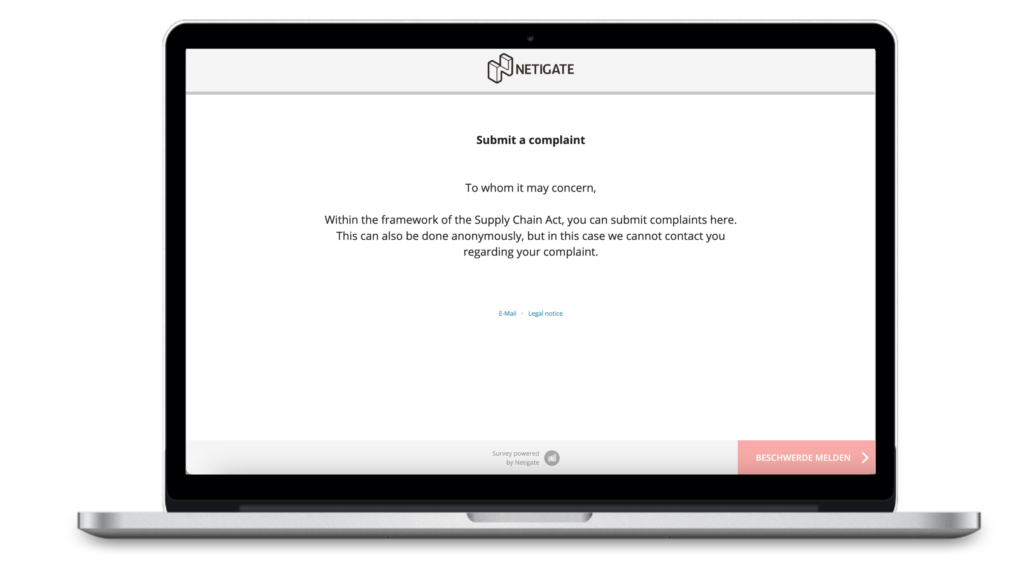
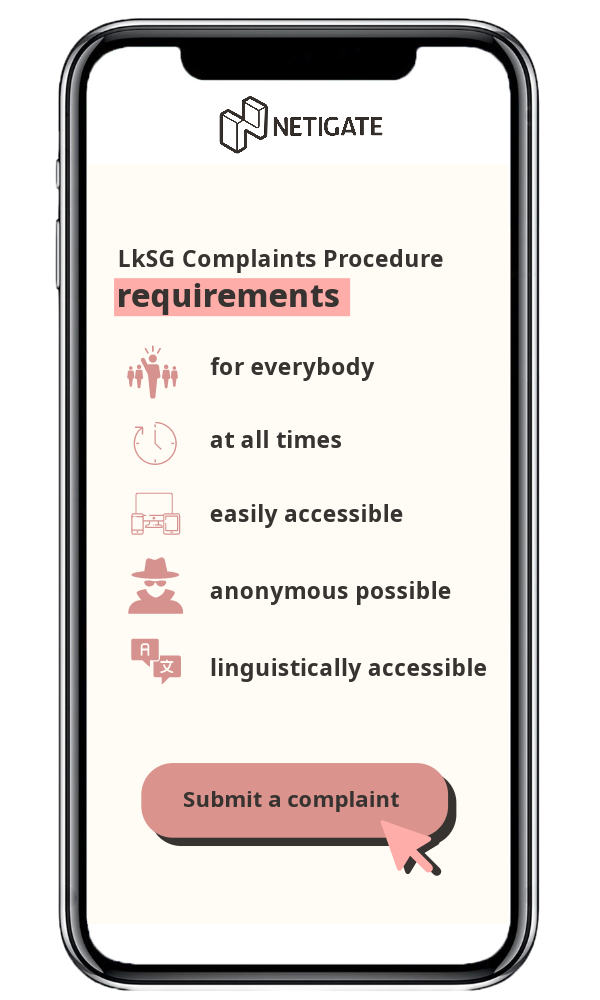
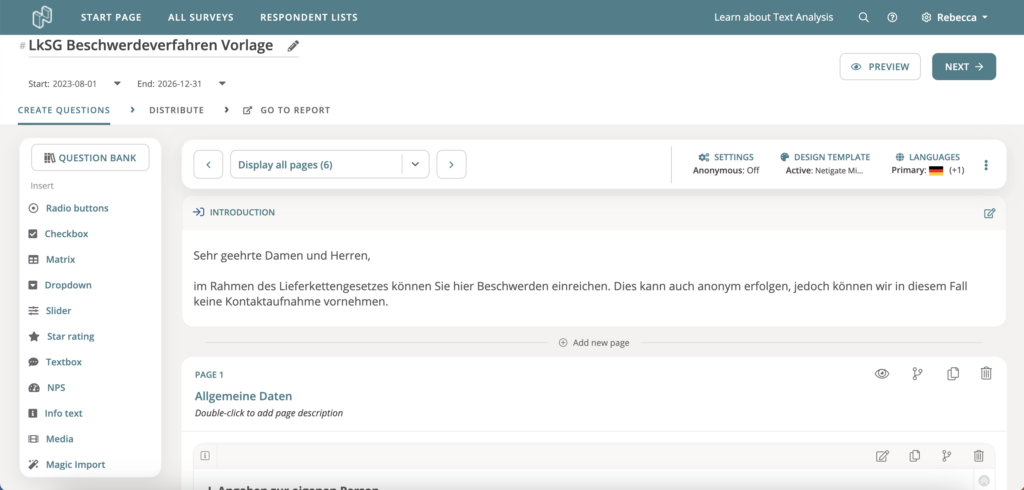
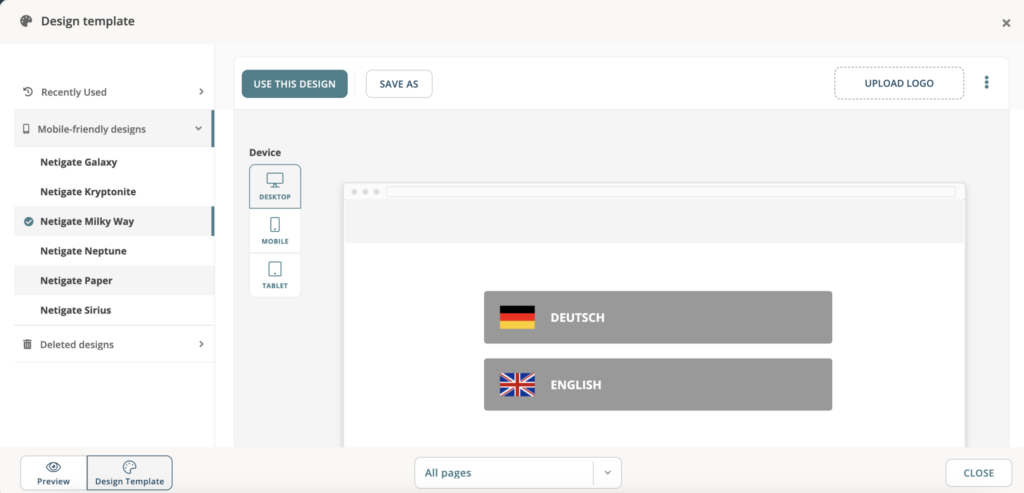
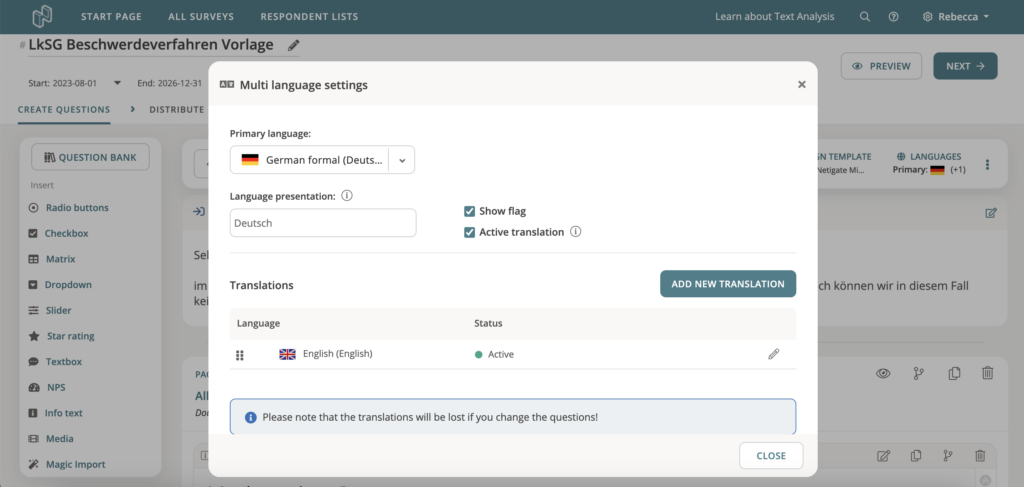

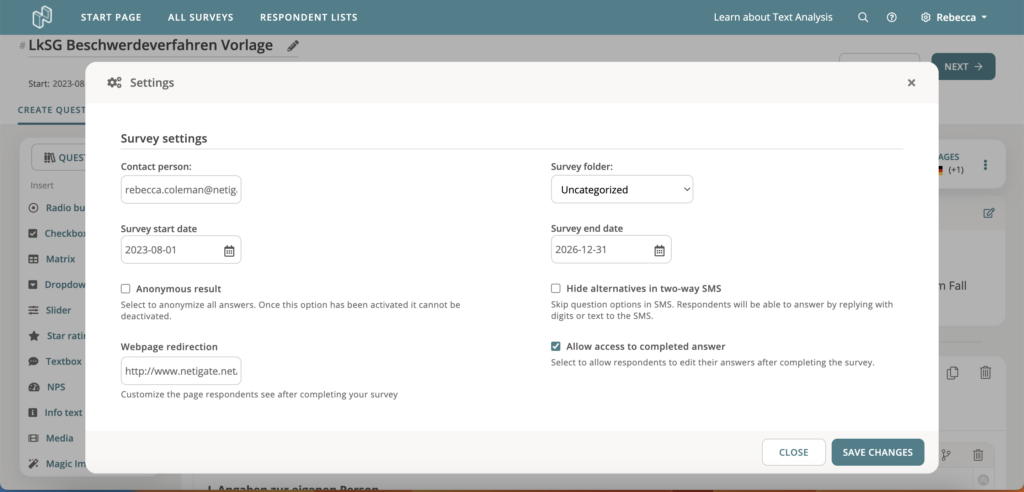




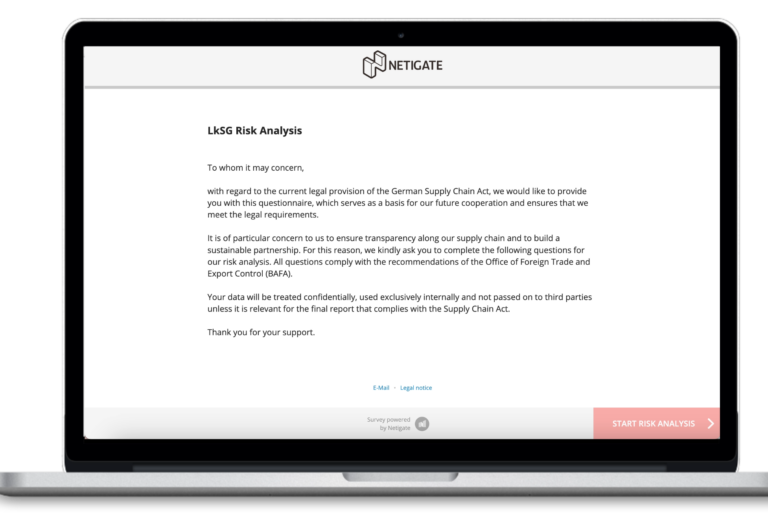
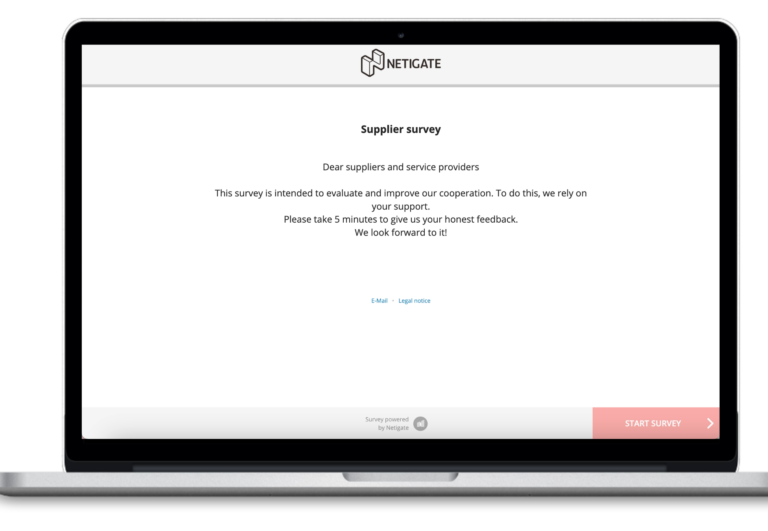
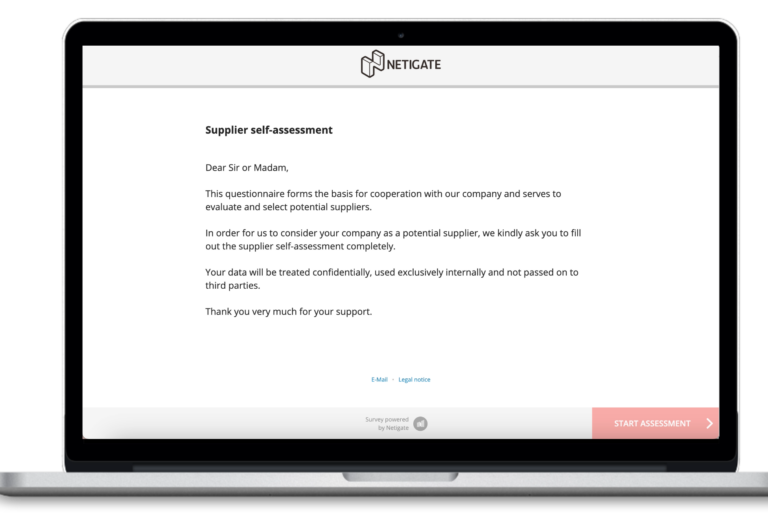
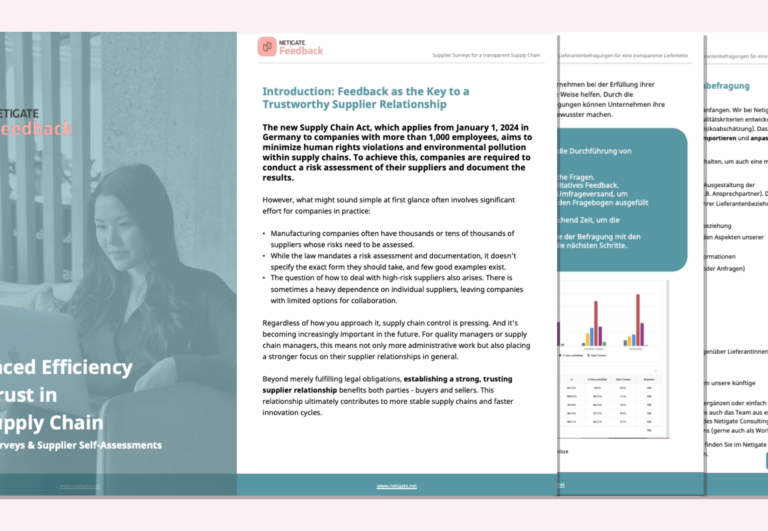



 Copyright © 2024 Netigate AB, Drottninggatan 25, 111 51, Stockholm, Sverige
Copyright © 2024 Netigate AB, Drottninggatan 25, 111 51, Stockholm, Sverige 